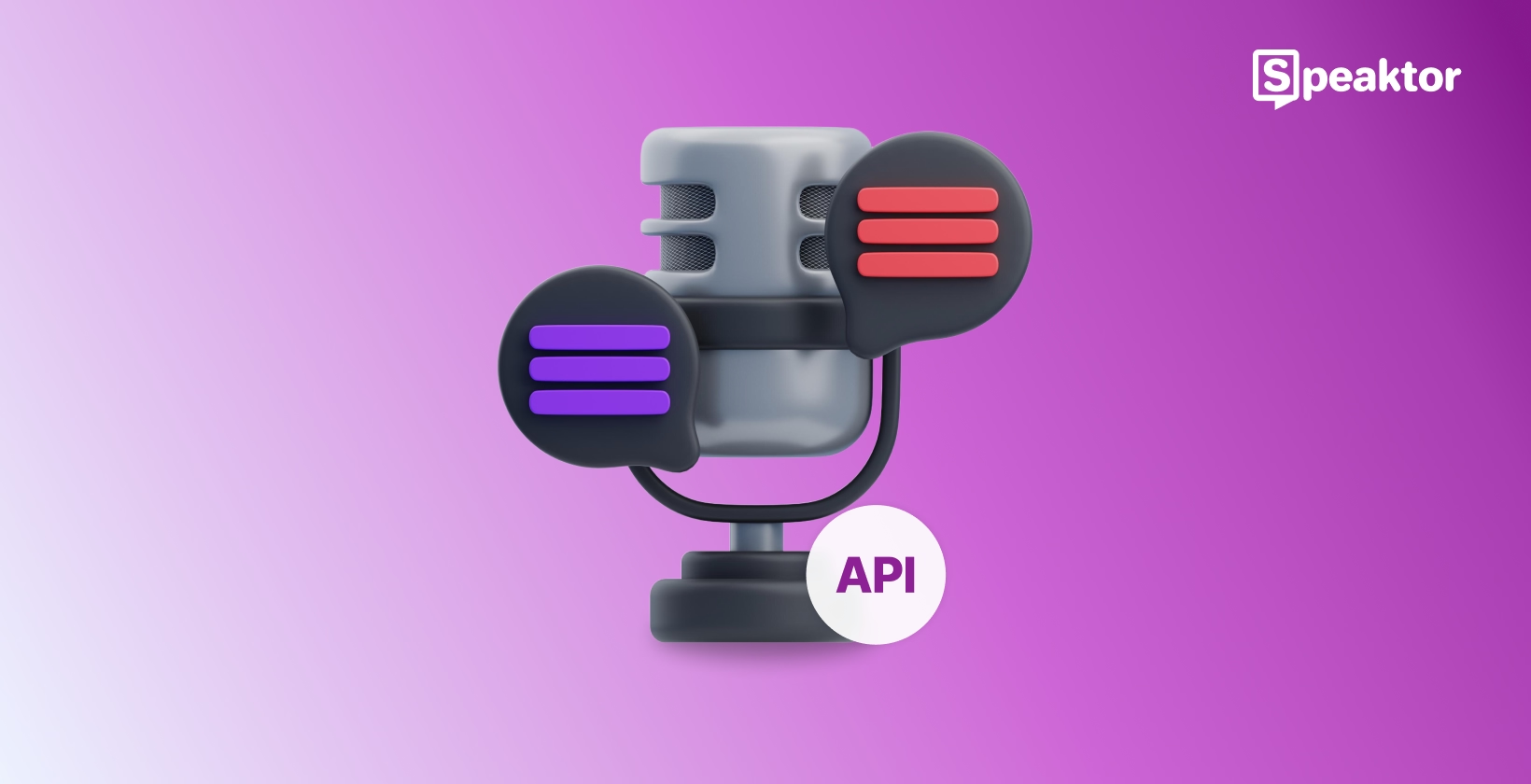
Best Voice Generation APIs for Developers in 2025
Transcribe, Translate & Summarize in Seconds
Transcribe, Translate & Summarize in Seconds
From audiobooks to virtual support, voice generation can be of significant usage. The construction of sophisticated speech applications begins with obtaining a voice generation API. Apart from naturalness and precision feeling, a text-to-speech API will need a broader evaluation.
For example, several AI voice generator APIs may need to be tested for quality and integration support. This guide will help you select the best TTS APIs for your project. It may include factors affecting speech synthesis APIs, pricing models, and customization capabilities. Explore voice generation software like Speaktor to enhance the creation of voice-enabled applications.

Key Factors in Choosing a Voice Generation API
Recording a voice-over is challenging enough. You need to make many attempts to get the result you want. There is insufficient time to get in the right mood and set the target pitch before recording. Here are some key factors in choosing a voice-generation API:
- Quality and Naturalness: A TTS system should produce fluid, natural speech with accurate articulation and smooth transitions.
- Language Support: Ensure the API supports multilingual text-to-speech.
- Integration Ease: For better engagement, look for APIs with emotional voice styles, contextual intonation, and varied speaking styles.
- Pricing Models: Consider cost-effectiveness, scalability, and support for contextual intonation and diverse speaking styles.
- Customization Options: For enhanced accuracy and flexibility, choose APIs with adjustable voice parameters, speech styles, and custom dictionaries.
Quality and Naturalness
A TTS system has to create a proper speech that sounds fluid, natural, and accurate. Term-specific APIs yield the best results as they ensure appropriate articulation. Listening becomes more pleasurable with natural intonation for speech.
Transformations between words and phrases have to flow naturally as well. Maintaining quality through multi-angled tests is possible through the usage of various content types. Checking all these factors ensures quality and judging different types of speech.
Language Support
When picking a TTS API, look for speech-language instead of primary audience use. Check whether high-quality voiceovers of all languages needed are available, not just famous ones. Check whether there are any restrictions on the number of languages and dialects.
Ensure voice recognition systems of different languages and regional accents are tested. Ensure even less common languages are covered. Within the exact text, APIs should also attend to multilingual issues without problems.
Integration Ease
For different use cases, look for APIs that can produce speech with different meanings and words. It is essential to pick APIs with styles of voice emotions like happy, sad, and excited. Focused intonation, which is also context-dependent, must also be provided. Support for different speaking styles, like news and storytelling, is necessary. APIs should provide greater emotional depth through subtle emotional nuances for more engaging speech.
Pricing Models
When choosing a TTS API, consider your financial plan, future expenditures, and how your company plans to grow. Scope out AI costs that suit your purpose without significant loopholes that charge extra fees for unexpected purposes. You also need to check if the API can scale up for large amounts of speech generation while still performing up to standards.
Check whether they provide contextual intonation and emphasis. Also, check whether they support different speaking styles, such as narration, newscasting, or storytelling. The API should provide emotionally infused articulation for conversationally engaging and realistic-sounding speech.
Customization Options
Different applications require different customization options. Look for an API that allows you to change the voice, pitch, rate, and speech volume as customization features. Users should also be able to change their speech styles to be straightforward while offering great utility.
APIs that enable users to select and create different voices can change how they interact with applications. Fine-tuning the output requires additional adjustable speech parameters like volume, pitch, and rate. Custom dictionaries and specific term construction pronunciation will also help ensure proper phrase accuracy.
Top Voice Generation APIs Compared
According to Grand View Research, the global AI voice generators market size was estimated at USD 3,564.0 million in 2023. It is projected to grow at a CAGR of 29.6% from 2024 to 2030. Here are some voice-generation APIs you can consider:
- Speaktor: A web-based AI-powered text-to-speech tool supporting 50+ languages.
- Amazon Polly : It uses deep learning to generate lifelike speech for various applications.
- Google Cloud Text-to-Speech : It provides near-human speech quality with 50+ languages and 380+ accents.
- Microsoft Azure Speech Service: Enables multilingual voice applications with customizable speech models.
- IBM Watson Text-to-Speech: Delivers high-quality voice synthesis across cloud environments.
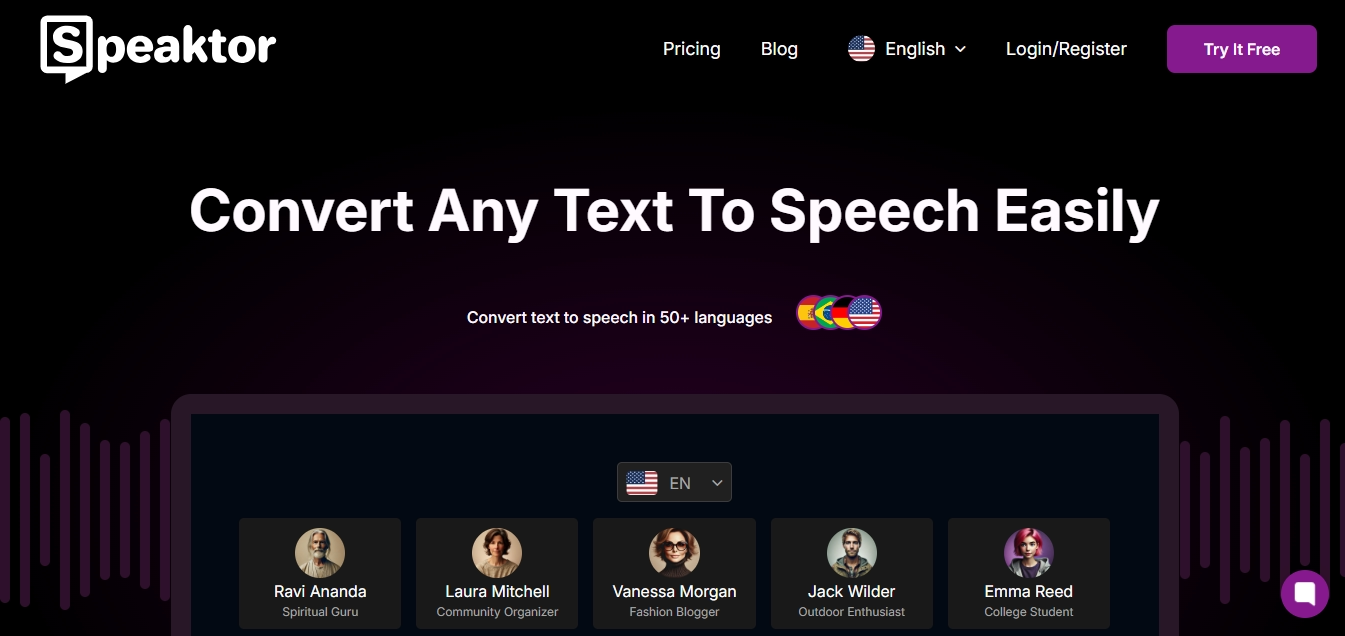
1. Speaktor
Speaktor uses advanced artificial intelligence to convert text into speech effortlessly. It allows you to create realistic audiobooks, videos, and voice-overs that quickly cover documents in over 50 languages. Speaktor is designed to provide a seamless experience for any requirement. It makes it incredibly easy for users to switch from listening to text to reading through multitasking.
Instead of downloading additional tools and extensions, Speaktor offers a simple web-based text-to-speech editor. Users can simply paste the text, choose their preferred accent, and let the software do its job. Users can grant access to four AI tools integrated into one toolbox. This is an effective solution for those needing high-quality text-to-speech conversion at an affordable price.
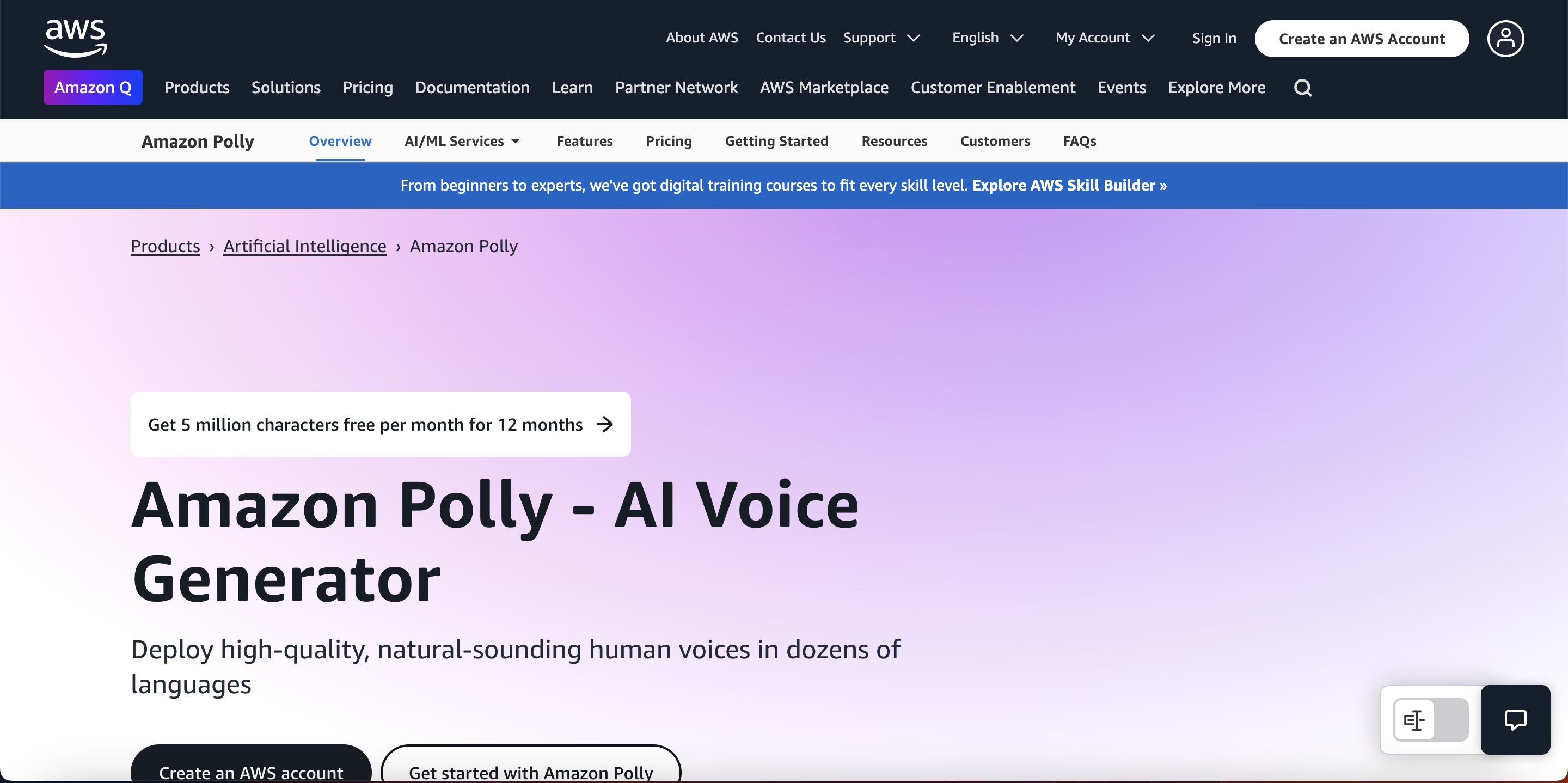
2. Amazon Polly
Amazon Polly develops speech using a deep learning service that requires minimal supervision. It can turn any text into an audio stream to fulfill users' needs. Polly transforms articles, webpages, PDFs, and other written documents. More than a dozen languages are supported in lifelike voices, allowing you to create speech-enabled apps. However, its voice customization options are limited compared to advanced voice cloning APIs.
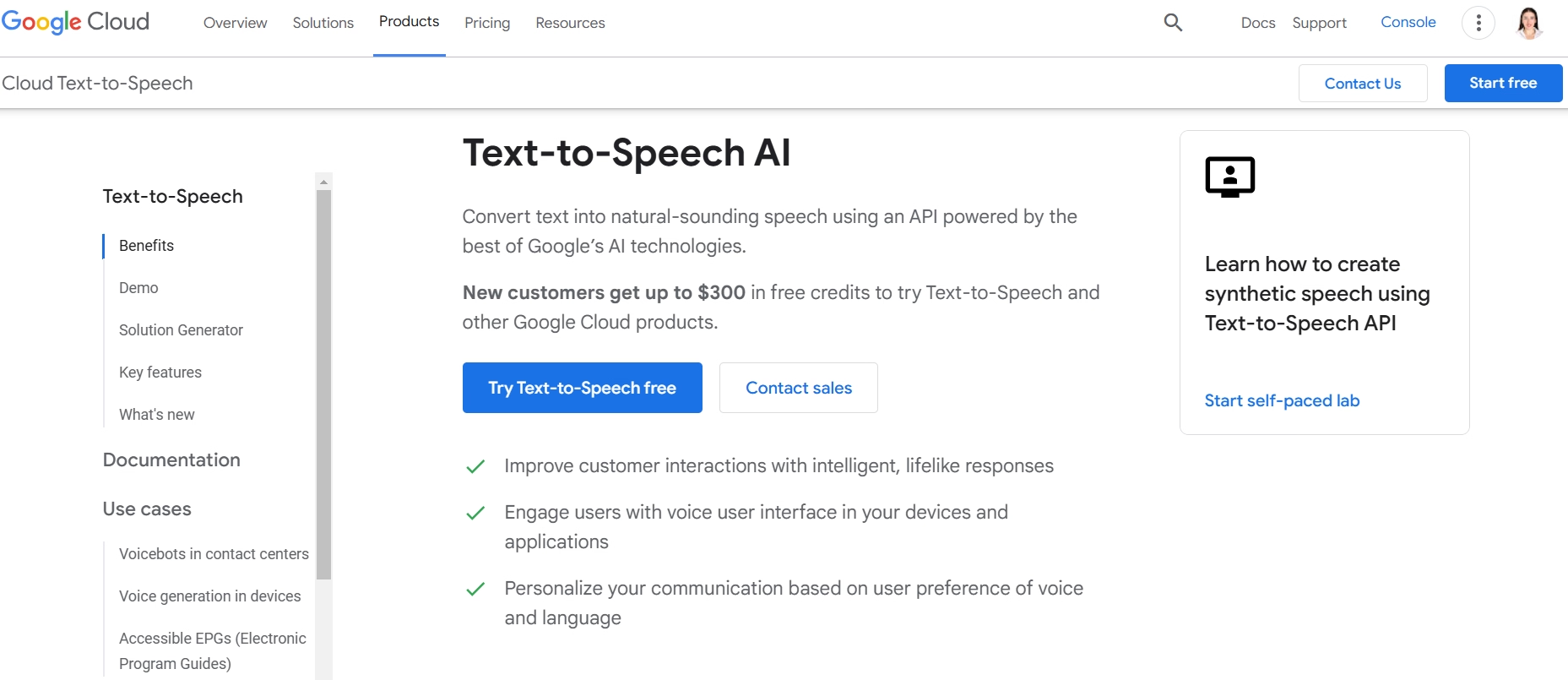
3. Google Cloud Text-to-Speech
Google Cloud text-to-speech offers proficient speech in over 50 languages and over 380 accents. An API developed specializing in speech generation from DeepMind's synthesis neural net models provides near-human quality. With Google’s voice technology, brand individuality can be captured by creating unique voice avatars to communicate with contacts. On the downside, pricing can become expensive for high-volume usage.
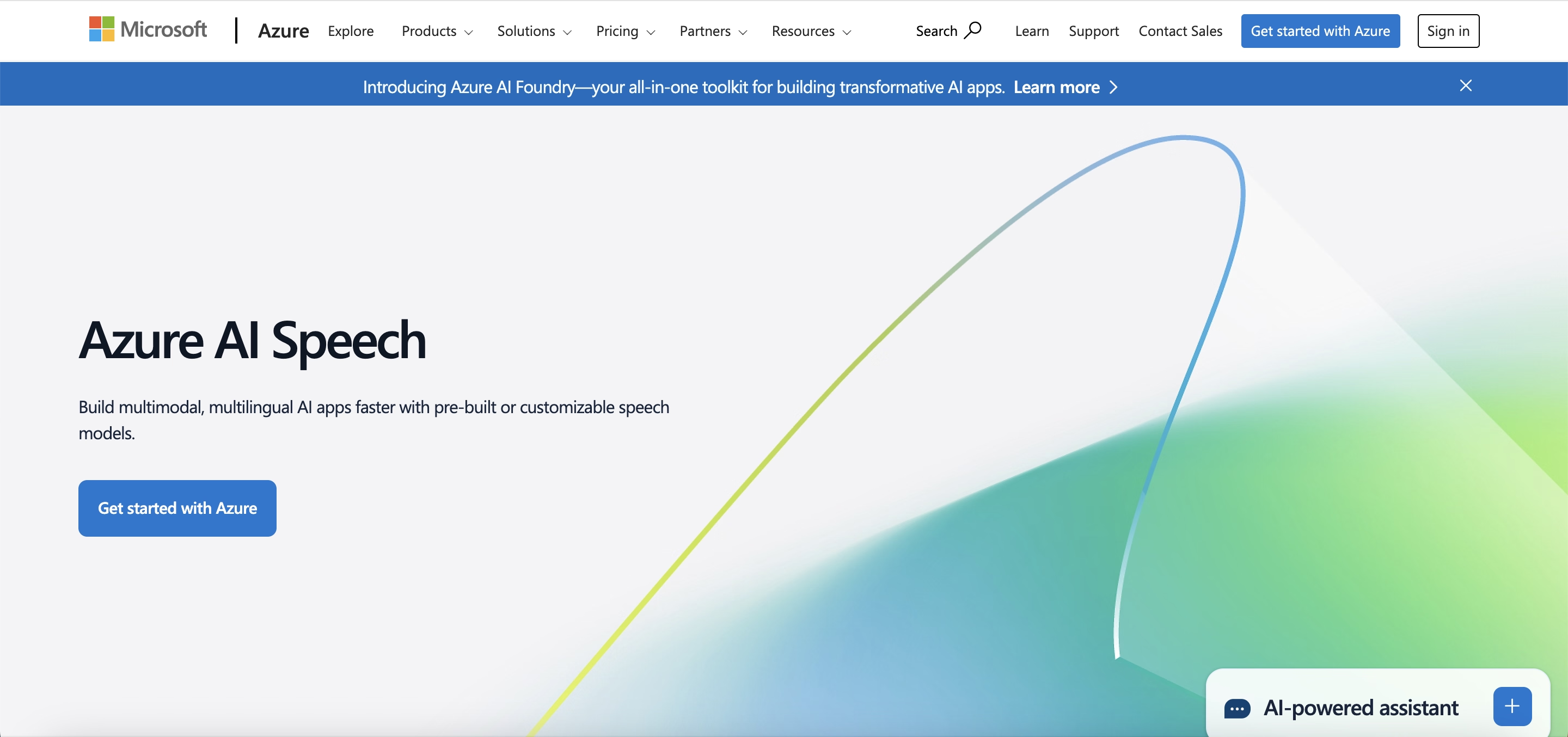
4. Microsoft Azure Speech Service
With the proper tools, building voice-infused applications can be easy to achieve. Azure AI Speech allows you to craft applications with multilingual capabilities using natural speech synthesis technology. You can tailor the speech to your requirements through the OpenAI Whisper model or a custom brand voice for your copilot. The limited free tier is not sufficient for extensive testing or small businesses looking to experiment with text-to-speech APIs.
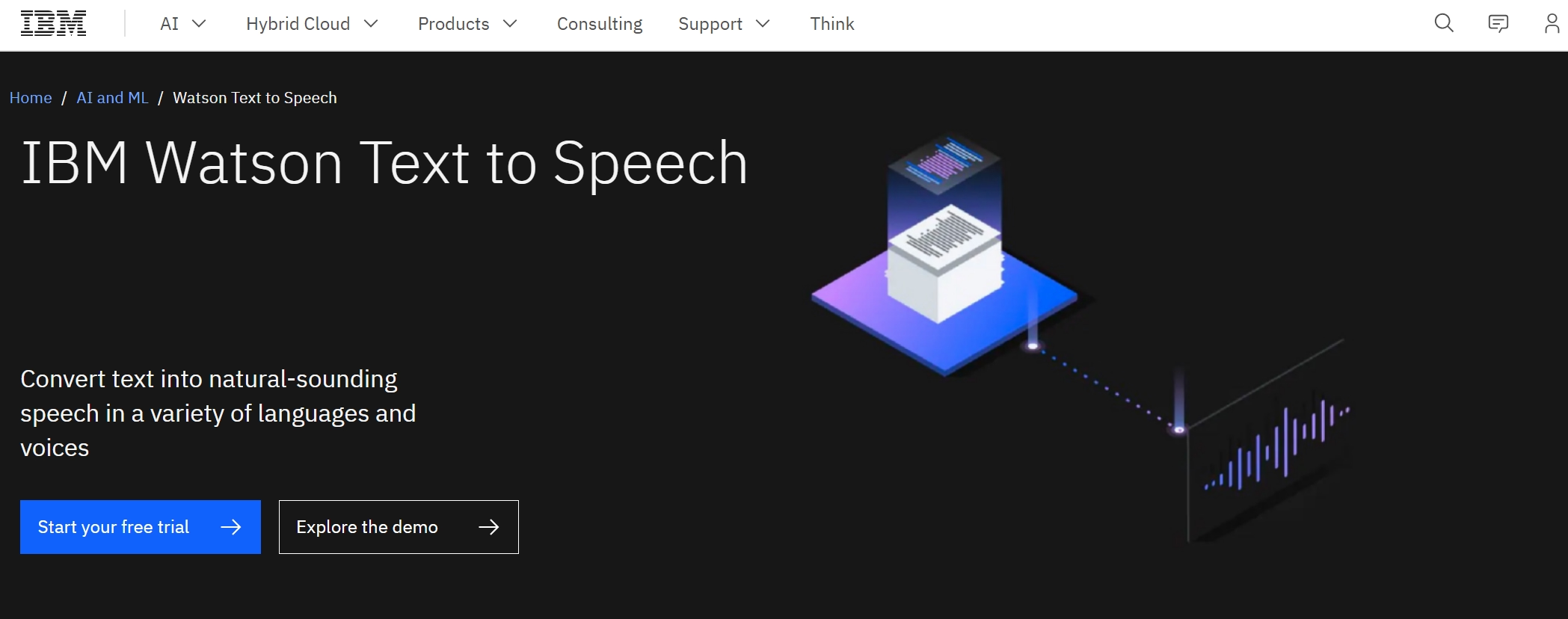
5. IBM Watson Text-to-Speech
IBM Watson Text-to-Speech converts written documents into verbal communication with human-like voices. It can function in any cloud environment, whether public or private, multi-cloud or hybrid, or even on-premises. It can respond to frequently asked questions at call centers using Watson AI's phone virtual assistant. Compared to competitors, the pricing of IBM Watson is high.
Implementation Considerations
Voice-powered AI technologies could significantly advance companies' operations and customer service delivery. Modalities between humans and machines, such as voice interaction devices, are taking these to a more advanced level.
- API Authentication: Secure access with JWT authentication and unique credentials while ensuring language and customization support.
- Rate Limits: Prevent system overload by limiting API requests for fair usage and optimal performance.
- Documentation Quality: Up-to-date documentation with code examples and SDKs simplifies API integration.
- Support Options: Multiple audio formats like MP3, Opus, and WAV cater to different application needs.
- Security Features: Encrypt data, protect API keys, and ensure compliance with security standards such as GDPR and HIPAA.
API Authentication
Choosing a TTS API can determine the success of your project. First, consider the language coverage and check which dialects and accents are included. Then, test voice quality by assessing its clarity and naturalness. Finally, check if there are options for further customization, such as voice tuning and modulation.
Pricing models should be compared to your expected usage. Authentication Token (JWT) is used to communicate with Voice API. The libraries make it possible to authenticate via JWTs (JSON Web Tokens). Vonage Voice Application ID and Private Key are used to generate the uniqueness of the Vonage Voice Application ID.
Rate Limits
Rate limits refer to the number of times an individual or program can access the information within a realm. Remote command API accesses are controlled to ensure fairness. Here, each individual or organization does not overload the system with commands. Ultimately, these measures must be in place to mitigate TTS API performance degradation in multi-user environments. Limiting the number of requests will help API users avoid delays.
Documentation Quality
Well-designed documentation is the cornerstone of effortless TTS API configuration. Select vendors that offer straightforward, up-to-date documentation with code snippets, SDKs, and how-tos. Good-quality documents with continuous updates facilitate smooth development processes.
Support Options
TTS APIs support multiple audio formats to accommodate different use cases. MP3 is the most commonly used format, as it suits most applications. Opus is used for streaming where low latency is required. AAC is popular for digital compression on YouTube and mobile devices. FLAC is best for high-quality archiving, as it provides lossless compression. Uncompressed audio is provided in real-time applications using WAV.
Security Features
According to Markets and Markets, the API Security Industry is anticipated to increase at a CAGR of 32.5% between 2023-2029 to reach around $3,034 million in 2028. Safeguard your API keys and set up secure communications with the TTS service. Sensitive information should be saved as environment variables, all data transmissions should be authenticated and encrypted, and proper authentication mechanisms must be implemented.
The API you select should also be compatible with the organization’s security policies and governing expectations. You would need data to be encrypted in transit and storage. Furthermore, compliance with applicable regulations (GDPR, HIPAA, etc.) is equally critical.

Making the Right Choice
Using voice commands in public can risk your or other people’s privacy. Voice recognition technology can be less effective in public settings. This is because conversations and noise can make it difficult or impossible to recognize speech. Here is when voice generation technology plays a role. Here are some factors to consider to make the right choice:
- Use Case Analysis: TTS enhances communication and user experience to facilitate accessibility in medicine, education, and customer service.
- Budget Considerations: Choose an API with tiered pricing and free trials to balance cost, quality, and scalability.
- Scalability Needs: Ensure the TTS API supports high loads, integrates with emerging tech, and follows RESTful principles.
Use Case Analysis
According to dyslexia help, 15 to 20 percent of the global population experience language-based learning disabilities. TTS tools have managed to penetrate various economic sectors. They are multifunctional and can serve as effective aids in improving accessibility, performance, and experience problems in several areas. Below are some use case analyses:
- Medicine: TTS technology facilitates healthcare by promoting medication adherence through reminders and enhancing prescription management with verbal instructions. Appointments can be scheduled in a voice prompt mode, ensuring patients remember their preset medical visits.
- Education: Textbooks can be produced as audiobooks. TTS helps with pronunciation by providing an audible description of words.
- Customer service: You can get personalized voice prompts in calls. Customer service applications support retail, health care, finance, transportation, etc.
Budget Considerations
Even though different TTS services have different pricing structures, costs will likely increase significantly with large-scale usage. Startups or programs with strict budgets face the hurdle of balancing quality, features, and price. Make sure to choose an API provider that has demonstrated successful large-scale implementations.
The provider should also be able to offer tiered pricing for different usage levels. Check if low-latency connections are available from other regions. Conducting comprehensive trials to assess the API's capabilities is essential. Start with providers that offer free trials to make the process affordable before switching to paid accounts.
Scalability Needs
As a prerequisite, ensure that the TTS engine can handle high text load per request or multiple requests using on-device (decentralized) TTS. Scalability, one of the defining features of TTS Web API functions, is represented by extensibility, adaptability, and sustainability. Extensibility means not reducing the quality of offered services even when there is a large volume of incoming requests.
RESTful principles are observed to ensure cooperation with many different programming languages and platforms. Adaptability, on the other hand, is the ability of the API to integrate with emerging technologies, simplifying its upgrading and enhancement. Sustainability, one of the last, emphasizes the API’s ability to function over long periods, notwithstanding the rapid pace of advancement of technology.
Conclusion
The proper voice generation API is essential for developing high-quality, engaging, and natural-sounding applications. With advancements in neural voice generation and voice synthesis APIs, businesses can now create seamless, human-like interactions for various use cases. Speaktor stands out as a reliable and cost-effective option among the top solutions. It offers multilingual text-to-speech capabilities and voice cloning API features to cater to diverse user needs. Investing in the correct voice synthesis API ensures a scalable and efficient solution for future-proofing your applications.
Frequently Asked Questions
Yes. Google Speech API offers a free tier with limited usage, but costs apply based on usage beyond the complimentary limit.
Voice API pricing varies by provider and depends on usage volume, features, and customization options.
Popular APIs include Google Cloud Text-to-Speech, Amazon Polly, Microsoft Azure Speech, and IBM Watson TTS.
An open API allows developers to integrate external services via public endpoints, enabling seamless software interoperability.

